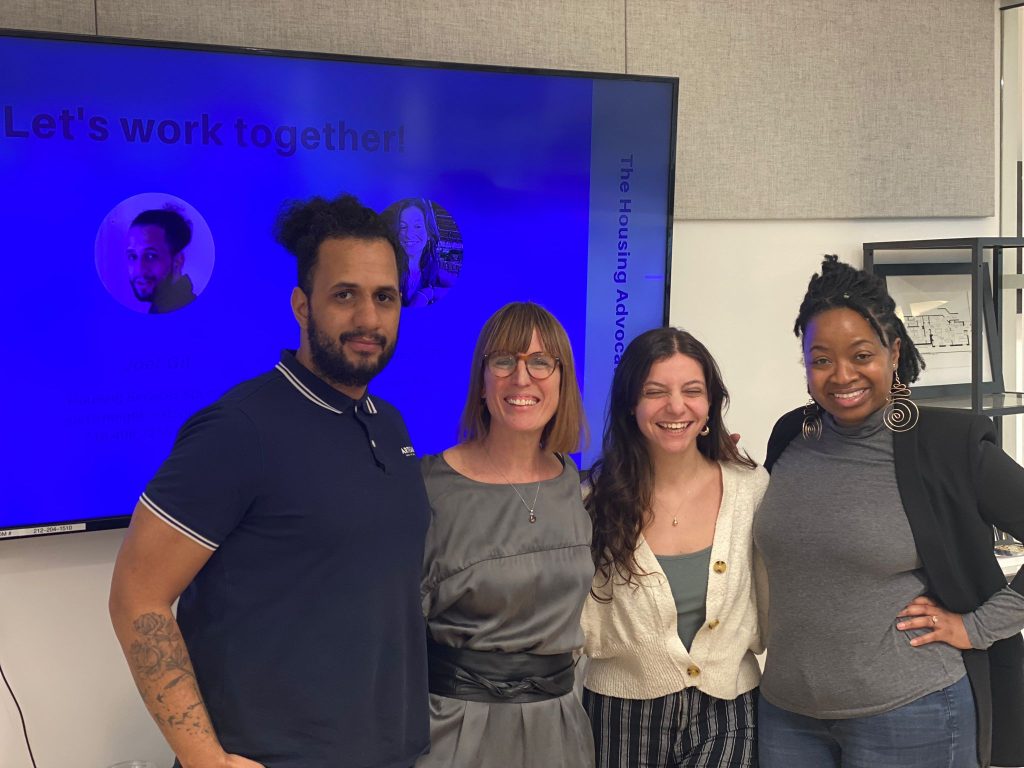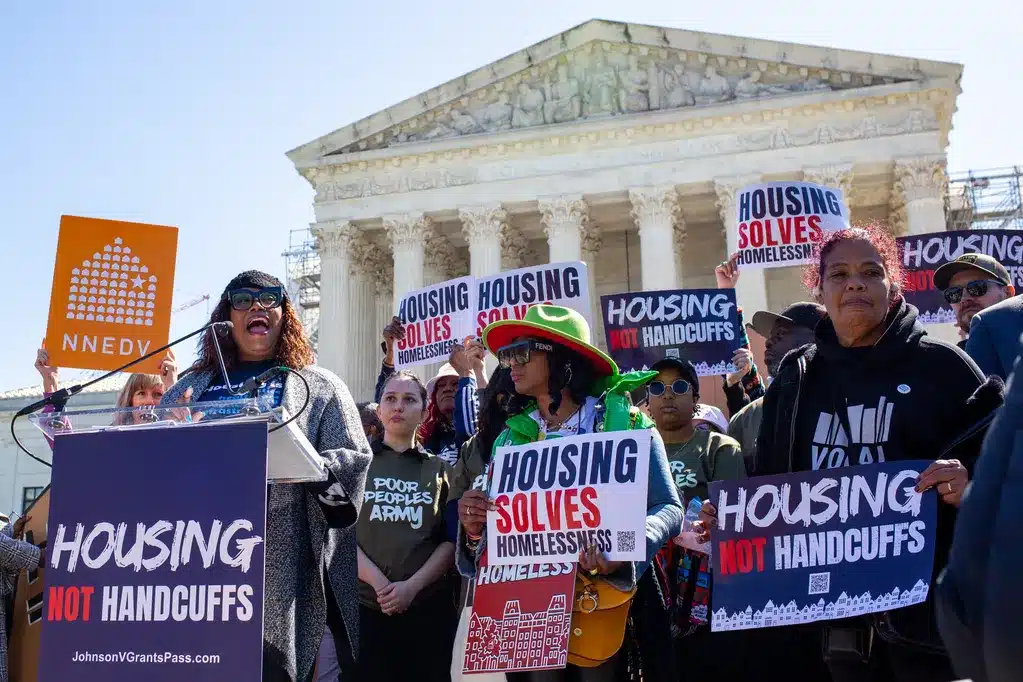Updated Feb. 13, 2024 | At a sleek office space in New York City’s Flatiron District, real estate agents and housing advocates gathered one October afternoon to talk about tenants. More specifically: voucher holders.
Sitting around a long conference table, the real estate agents expressed their daily bewilderment at receiving an average of 100 applications for a single apartment listing. Many applications come from voucher holders, they said, and a number of those applicants often live in precarious housing situations, like shelters.
It’s not uncommon for real estate agents and landlords to mischaracterize voucher holders as “bad tenants” who may destroy properties or cause issues within buildings. And it’s not unusual for landlords or agents to ignore housing inquiries from voucher holders. Tenants who receive government subsidies to pay for rent, like Section 8 housing vouchers or New York City’s CityFHEPS, FHEPS, or other programs, are often illegally discriminated against by landlords and brokers, housing advocates say. What should be a straightforward transaction between tenants, the government, and landlords is often permeated with unchecked bias and racism.
In a city where [half] of the apartments are held by real estate agencies, agents will ghost, or ignore, voucher holders or flat out refuse to work with them.”
SUZANNE ADLER
“In a city where [half] of the apartments are held by real estate agencies, agents will ghost, or ignore, voucher holders or flat out refuse to work with them,” says real estate agent Suzanne Adler. “There are lawsuits right now where there are luxury brokers who feel they can’t respond to voucher holders.”
For instance, most recently in September 2023, top real estate agents in New York City were sued for allegedly ignoring a Section 8 tenant’s emails for housing assistance.
The October gathering—co-hosted by Brooklyn-based community organization Neighbors Together and Adler—focused on dismantling bias against voucher holders and destigmatizing the process of working with them.
For years, Adler and Neighbors Together have helped voucher holders in the city find housing, and they’ve held workshops like these in the hopes of creating a more equitable and sustainable environment where the lines of communication are open between prospective tenants, real estate agents, and landlords.
How did this collaboration begin, how successful have their efforts been, and what lessons can Neighbors Together and Adler offer to voucher holders and to other real estate agents?
How they started working together
Neighbors Together began in 1982 as a soup kitchen, social services provider, and organizer. Although the organization serves all five boroughs, it focuses most of its efforts on three of the lowest-income neighborhoods in the city—Ocean Hill, Brownsville, and Bedford-Stuyvesant, which are predominantly Black communities.
Fast forward to 2016 when the need for helping voucher holders find housing became more acute in the community. This need prompted a movement for Neighbors Together to get into housing advocacy and provide information to help people be more successful in their search for rental housing, says Nathalie Smythe, the director of programs and HR at Neighbors Together.
The organization’s direct relationship with real estate agents began in 2019 when it sought to hire someone who could help. At the time, Adler was a new agent looking for part-time work, and she says she applied for the job because she had previously worked with voucher holders and was disgusted at how badly they were treated by landlords and her fellow real estate agents.
[RELATED ARTICLE: Landlords on Notice—Section 8 Discrimination Will Cost You]
Neighbors Together staff didn’t expect to hire a real estate agent. “It started with trust, and I had to put my bias aside of real estate agents,” says Smythe. “Our initial goal is to protect the voucher holder and identify the bad guys. I knew it wasn’t true that all real estate agents are the bad guys. If they are applying for this role, it is that they care. It’s about being open and collaborating with the other side.”
Adler also had concerns. “It was the same for me. In my interview I was worried about my own race identity,” says Adler, who is white. “When I was learning about white supremacy culture, I learned particularly white women are a detriment to the cause because they are doing a savior kind of thing so I questioned, ‘Can I come in here? How do I feel about that?’”
Despite their initial worries, Adler and Neighbors Together decided to move forward. “We needed people for our Empowerment Program, and we knew it would be helpful to have someone that knew how to navigate real estate in New York City,” Smythe says.
Adler says she and the Neighbors Together team created clear boundaries from the start. For instance, because the organization was paying her an hourly salary, Adler wouldn’t collect commission fees.
They gradually built a relationship of understanding and trust. “One big relationship builder, after George Floyd was murdered, we decided as an organization to talk about white supremacy,” Adler says, “and how it shows up in the organization and by extension how people were treated in the real estate industry and witnessed that firsthand. During the pandemic, we met on Zoom and then social distancing meetings in person, where we were also having those conversations; I felt like that brought us closer.”

Adler worked at Neighbors Together for three years, and together they helped 120 voucher holders find stable housing. If a voucher holder was having trouble getting information about a rental, or being refused housing, Adler would reach out to the landlords and/or real estate agent. She’d let them know it was illegal to discriminate against a person who pays for rent with subsidies or other forms of public assistance.
“Suzanne’s impact was felt immediately in the year of her hire,” says Smythe.
Adler says it was incredibly important to build trust between the various parties. “I really tried to create connections between management companies, landlords, and real estate agents because it’s all about relationship building for trust . . . that helps combat the negative narratives of landlords and voucher holders,” Adler says.
Along with helping renters secure housing, during the pandemic the organization helped 900 members receive social services, and another 580 members received a housing-specific service, such as a housing search workshop, source-of-income discrimination training, housing application assistance, and/or housing advocacy.
Last year, Adler left Neighbors Together and joined Compass, one of the city’s major real estate companies. She says it was a good career opportunity for her, and she liked Compass’s tech platform, which allows her to do more business in an easier way. The real estate company has faced accusations of discrimination in the past. In 2021, Compass and others were accused of source-of-income discrimination in a complaint filed with the District Court for the Southern District of New York. In 2022, Compass agreed to a settlement and to enact reforms.
“The difference between Compass and other real estate companies is that they are very open, and they have the culture of trying to grow and learn,” says Adler. “I don’t think this was a malicious thing. This goes back to everything, and everyone being siloed, and no one talks to each other. Overall, in real estate, the conversations are really lacking, and people don’t know what to do.”
Although Alder is working at a different place, she and Neighbors Together continue to partner and host workshops, like the housing voucher workshop in October. Moreover, they are collaborating on a buddy program between Neighbors Together, Unlock NYC, and Home is a Human Right where they will pair voucher holders with volunteers who will assist them in looking for housing. Adler will be the point person for guidance and support and to answer any questions volunteers have.
Neighbors Together continues to directly help voucher holders secure housing. Joel Gil, a housing services specialist at Neighbors Together who was hired full-time in 2022, has taken on Adler’s former responsibilities, among other duties.
documenting discrimination
Neighbors Together takes full advantage of the city’s Human Rights Law, which bans source-of-income discrimination.
Since the discrimination that voucher holders experience is not often documented, Neighbors Together conducts control tests where someone from their housing team, like Jolie Pont, a housing advocate, emails a landlord or agent who, for example, has ghosted a tenant applicant. Pont tells the landlord or agent that she has a voucher and wants to rent the unit. If she is refused service or ignored, Pont writes a report and sends it to the city’s Commission on Human Rights. The commission then sends a letter to the landlord letting them know they violated the law, and the landlord must respond.
“That’s how a lot of our members get housed, through this source-of-income discrimination [law],” says Pont. “Brokers and landlords know when they are breaking the law, so they sometimes aren’t too combative.”
[RELATED ARTICLE: Can Prohibiting Source-of-Income Discrimination Help Voucher Holders?]
Source-of-income discrimination has been illegal in the city since 2008, and agents should know that it’s against the law not to work with voucher holders, but Adler says she’s heard real estate agents and landlords say things like, “We want good, co-working people,” which is a covert way of discriminating against voucher holders. “I had a rental landlord who I had to fire because they didn’t understand fair housing. The agent is sometimes just the spokesperson for the landlord,” says Adler.
In the last two years, the Commission of Human Rights has helped resolve more than 300 cases of source-of-income discrimination. The city estimates that it has obtained over $2 million in damages since 2017.
The climate has made real estate agents fear being accused of or cited for discrimination, or “making a mistake, or incriminating themselves unknowingly,” says Adler. How can agents do better? Adler says they should ask for help from community-based organizations in the neighborhoods where they show most apartments in. “The education offered on this is not sufficient. … It’s important to ask for help because [agents will] have a better chance of getting someone housed, which is what we want, to eradicate the housing crisis in our city.”
A last piece of advice is that agents must understand that some tenants may not have the expected tools or skills to communicate with them, like technology or internet access. Agents must be willing and able to provide coaching.
moving forward
The city has taken the initiative to fight discrimination against voucher holders with campaigns like the mayor’s partnership with Street Easy. But concrete changes within the real estate industry could help those in need find housing faster.
For example, in Compass’s 2022 settlement, the real estate company agreed to re-commit to its nondiscrimination policy, and provide its agents with mandatory training and education on how to work with voucher holders and file paperwork. It also agreed to provide higher commissions for agents who work with voucher holders.
Matthew Handley, one of the attorneys for the plaintiffs in the complaint, told The Washington Post he hopes the steps Compass is taking could be a game changer for the industry.
Bans on source-of-income discrimination with accompanying enforcement, citywide initiatives to educate landlords, real estate agents and companies, and tenants about working together, and lawsuits that publicize bad actors could help dismantle biases and show that everyone, regardless of race, ethnicity, and class, has the right to housing. And partnerships between real estate agents and community-based organizations could play a major role in effectively helping renters who use vouchers or other subsides secure housing.
Editor’s Note: This article has been updated to reflect the correct location where the October real estate agent workshop took place. It occurred in an office in the Flatiron District, not Tribeca.






Comments